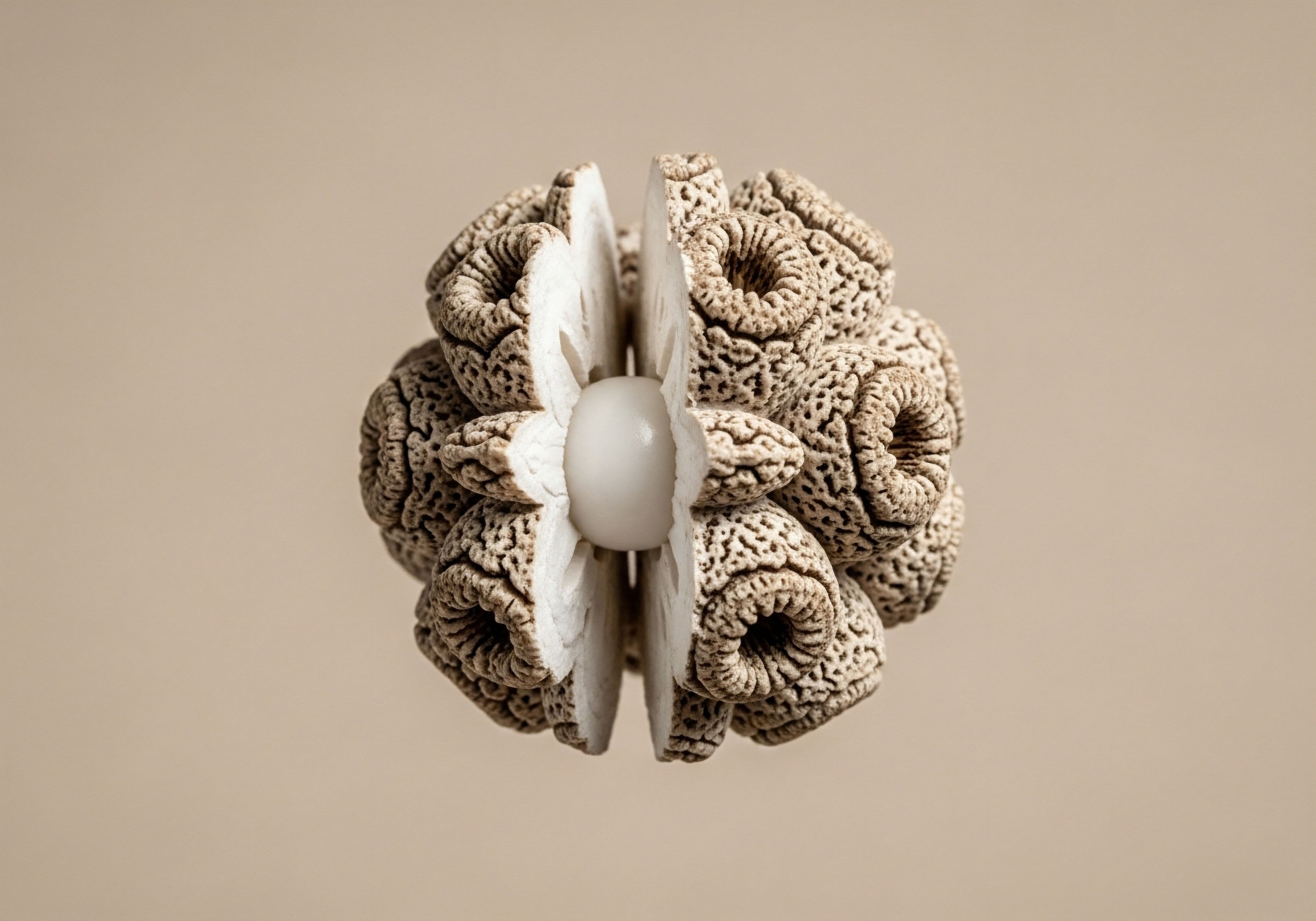

The Blueprint Rewritten Overnight
The human genome, a sophisticated biological instruction manual, is not a static document. It is a dynamic system, responsive to the intricate dance of our daily existence. Rest, often perceived as mere downtime, is in fact a critical period of active biological recalibration.
During sleep, the body initiates profound processes that influence gene expression, cellular integrity, and hormonal equilibrium, effectively rewriting aspects of our genetic blueprint for optimal function and resilience. This nightly renovation is fundamental to sustained vitality and peak performance.

Gene Expression ∞ The Nightly Transcriptional Audit
Sleep orchestrates a sophisticated transcriptional audit, influencing which genes are activated and which remain quiescent. Research indicates that sleep promotes the upregulation of genes essential for macromolecule biosynthesis, including proteins and lipids. This molecular machinery is fundamental for cellular maintenance and repair.
Specific proteins, sometimes referred to as ‘sleep-need-index phosphoproteins’ (SNIPPs), are associated with synaptic function and their phosphorylation levels form a molecular signature for the drive to sleep, underscoring sleep’s direct role in neuronal communication infrastructure. The expression of these genes is directly modulated by sleep, ensuring that cellular resources are allocated efficiently for restoration.

Epigenetic Signatures ∞ Rest’s Imprint on Genetic Access
The impact of rest extends beyond simple gene activation; it fundamentally influences the epigenome. Epigenetic modifications, such as DNA methylation and histone modifications, act as regulators of gene expression, determining how accessible genetic information is. Even a single night of sleep deprivation can trigger significant epigenetic alterations.
These changes can affect the expression of ‘clock genes’ that govern our circadian rhythms, influencing metabolism and numerous other physiological processes. This demonstrates that sleep is not just about cellular function, but about controlling the very access and expression of our genetic code, creating lasting imprints that can influence long-term health trajectories.
Acute sleep deprivation can lead to a 139% increase in oxidative DNA damage, significantly impairing the body’s ability to repair itself.

Cellular Integrity ∞ The Nightly Restoration Protocol
While wakefulness demands constant cellular activity and exposes cells to environmental stressors and metabolic byproducts, sleep provides the dedicated window for comprehensive cellular repair. This is when the body performs essential maintenance tasks that are impossible during periods of activity. Damaged DNA is meticulously repaired, proteins are synthesized for tissue regeneration, and harmful free radicals are neutralized.
Non-REM sleep stages are particularly vital for physical restoration, tissue repair, and immune system strengthening. REM sleep, conversely, supports crucial brain health functions, including waste clearance and memory consolidation. This nightly restorative protocol is a direct defense against cellular aging and degradation.

DNA Repair ∞ Safeguarding the Genome
DNA damage is an inevitable consequence of cellular metabolism and environmental exposure. Sleep plays a direct role in mitigating this damage. Studies reveal that sleep deprivation inhibits the expression of DNA repair genes, such as those involved in base excision repair and nucleotide excision repair pathways.
Conversely, adequate sleep promotes the repair of DNA breaks, particularly in neurons. The glymphatic system, the brain’s waste removal system, becomes highly active during sleep, flushing out metabolic toxins and cellular debris that, if accumulated, contribute to neurodegeneration. This nightly cleansing and repair process is essential for maintaining genomic stability and preventing disease initiation.

Protein Synthesis and Tissue Regeneration
During deep sleep, the body significantly increases the release of growth hormone. This hormone is a potent driver of cell regeneration, activating genes critical for tissue repair. Approximately 75% of daily growth hormone release occurs during deep sleep, underscoring its restorative power. This process is fundamental for muscle recovery, tissue healing, and the regeneration of organs. Without sufficient deep sleep, these essential repair cycles are compromised, leading to accumulated cellular damage and accelerated aging.

Hormonal Harmony ∞ Circadian Rhythms and Endocrine Balance
The intricate network of hormones governing our physiology operates in concert with our circadian rhythms, with sleep serving as a central regulator. Hormones like melatonin, cortisol, growth hormone, insulin, leptin, and ghrelin exhibit distinct daily oscillations synchronized with the sleep-wake cycle.
Melatonin, the primary sleep hormone, signals darkness and promotes sleep onset, synchronizing the body’s internal clock. Cortisol, the stress hormone, follows a diurnal pattern, peaking in the morning to promote alertness and gradually declining throughout the day. Disruptions to sleep patterns directly interfere with these finely tuned hormonal rhythms, impacting everything from metabolic health and appetite regulation to stress response and immune function.

Metabolic Regulation ∞ Sleep’s Role in Glucose and Lipid Homeostasis
The circadian system, deeply influenced by sleep, plays a critical role in glucose and lipid homeostasis. Hormones such as insulin, leptin, and ghrelin, which regulate appetite, satiety, and fat storage, are directly affected by sleep quality and timing.
Sleep deprivation leads to dysregulation of these appetite hormones, often increasing hunger and cravings, contributing to weight gain and an increased risk of obesity and insulin insensitivity. The body’s ability to process glucose efficiently is also compromised by poor sleep, highlighting sleep’s fundamental role in metabolic health.


The Mechanics of Cellular Recalibration
Understanding the mechanisms by which rest recalibrates our genetic blueprint reveals a sophisticated biological engineering process. This nightly overhaul involves precise molecular signaling, coordinated hormonal shifts, and the activation of dedicated repair pathways. The body leverages specific sleep stages and hormonal cascades to execute a comprehensive restoration, optimizing cellular function and genomic integrity. This intricate process ensures that each day begins with a system reset, primed for performance and resilience.

The Molecular Orchestra of Sleep
The drive to sleep is governed by complex molecular processes. During wakefulness, a homeostatic mechanism builds up a “sleep debt.” This drive is influenced by the accumulation of specific signaling molecules, including the ‘sleep-need-index phosphoproteins’ (SNIPPs). These proteins, primarily located at synapses, undergo phosphorylation changes that signal the brain’s increasing need for rest.
The brain’s response to this signal involves a cascade of neurotransmitters and neuropeptides that shift the body from a state of alertness to one of rest.

Gene Expression during Sleep Cycles
Specific gene expression patterns emerge during different sleep stages. During non-REM sleep, there is a pronounced upregulation of genes involved in macromolecule synthesis, including proteins and lipids. This supports cellular repair and growth. For instance, genes encoding for molecular chaperones, like BiP, are upregulated with extended wakefulness, indicating a cellular response to stress that is managed and reversed during sleep. The coordinated activity of these genes ensures that cellular structures are rebuilt and metabolic processes are restored.

Epigenetic Regulation ∞ Fine-Tuning Gene Expression
Sleep acts as a critical modulator of epigenetic marks, influencing gene expression without altering the underlying DNA sequence. DNA methylation, a key epigenetic mechanism, is dynamically regulated by sleep. Studies show that sleep deprivation can lead to tissue-specific changes in DNA methylation patterns, particularly affecting clock genes.
These alterations can either activate or deactivate genes, influencing circadian rhythmicity and metabolic function. For example, hypermethylation of circadian clock genes like CLOCK and CRY1 has been observed after sleep deprivation, disrupting the body’s natural timing mechanisms. Histone modifications, another layer of epigenetic control, are also impacted; sleep deprivation can lead to decreased histone acetylation, which is linked to impaired cognitive function and abnormalities in the circadian clock.

Restorative Processes ∞ DNA Repair and Cellular Cleanup
The body employs dedicated systems for repair and cleanup during sleep. The glymphatic system, a brain-wide waste removal network, is significantly more active during sleep. It utilizes cerebrospinal fluid to flush out metabolic byproducts, neurotoxins, and misfolded proteins that accumulate during wakefulness.
This process is crucial for preventing the buildup of harmful substances, such as amyloid proteins associated with neurodegenerative diseases. Simultaneously, cellular machinery actively repairs DNA damage incurred during the day. This involves the expression of specific DNA repair genes, ensuring the integrity of the genome. When sleep is insufficient, this repair capacity is diminished, increasing the risk of accumulating unrepaired cellular stress and damage.
| Sleep Stage | Primary Cellular & Genetic Functions |
|---|---|
| Non-REM Sleep (Light & Deep) | Tissue repair, immune system strengthening, energy restoration, macromolecule biosynthesis (protein, lipid synthesis), DNA repair gene expression upregulation. |
| REM Sleep | Brain health support, waste product clearance (glymphatic system activation), memory consolidation, synaptic plasticity modulation, emotional processing. |

Hormonal Synchronization ∞ The Circadian Clock at Work
The endocrine system is intrinsically linked to the circadian rhythm and sleep cycles. Melatonin production, driven by darkness, initiates the sleep cascade. As melatonin levels rise, the body prepares for rest, and the secretion of other hormones adjusts accordingly. Growth hormone, essential for cellular repair and regeneration, is predominantly released during deep non-REM sleep.
Cortisol levels, which should naturally peak in the morning to promote alertness, are significantly influenced by sleep timing and quality. Dysregulation of these hormonal rhythms due to poor sleep can lead to a cascade of negative effects, including impaired glucose metabolism, altered appetite signals, and heightened stress responses.

Appetite and Metabolism Control
Sleep directly influences the hormones that regulate hunger and satiety ∞ ghrelin and leptin. Adequate sleep maintains a balance between these hormones, promoting feelings of fullness and regulating energy expenditure. Sleep deprivation disrupts this balance, often increasing ghrelin (the hunger hormone) and decreasing leptin (the satiety hormone), leading to increased appetite and a predisposition to overconsumption.
This hormonal dysregulation, combined with impaired insulin sensitivity often seen with sleep loss, creates a fertile ground for metabolic dysfunction, weight gain, and the development of conditions like type 2 diabetes.


The Cadence of Recalibration
The efficacy of rest in recalibrating our genetic blueprint is profoundly tied to its consistency, duration, and timing. Simply engaging in sleep is insufficient; the quality and adherence to natural biological rhythms are paramount. Understanding when and how to optimize sleep provides the critical leverage for unlocking its full regenerative potential. This involves aligning with the body’s intrinsic circadian programming and ensuring sufficient time for each vital sleep stage.

Establishing a Circadian Foundation
The body’s internal 24-hour clock, the circadian rhythm, governs a multitude of physiological processes, including sleep-wake cycles, hormone production, and metabolic activity. This rhythm is primarily synchronized by light exposure. Consistent exposure to natural light during the day and minimizing artificial light, especially blue light from screens, in the evening helps anchor this internal clock. A stable circadian rhythm is the bedrock upon which effective sleep and subsequent genetic recalibration are built.

The Power of Consistent Sleep Schedules
Adhering to a consistent sleep schedule, even on weekends, is a powerful strategy for reinforcing the circadian rhythm and maximizing the benefits of sleep. Going to bed and waking up around the same time each day signals to the body when to initiate sleep-promoting hormone production, like melatonin, and when to anticipate wakefulness, marked by cortisol release.
This predictability allows the body to execute its repair and regulatory processes efficiently. Irregular sleep patterns disrupt this delicate hormonal and genetic synchronization, diminishing the restorative impact of sleep.

Duration ∞ The Optimal Window for Repair
While individual sleep needs vary, a general consensus points to 7-9 hours of quality sleep per night for most adults to support optimal health and genetic recalibration. This duration ensures sufficient time is spent in all crucial sleep stages, allowing for comprehensive cellular repair, hormonal regulation, and cognitive processing.
Chronic sleep deprivation, even by a few hours per night, can accumulate damage and disrupt these vital processes. For instance, studies indicate that even one night of partial sleep deprivation can activate DNA damage responses and promote cellular senescence.

The Criticality of Sleep Stages
Each sleep stage offers unique contributions to our biological restoration. Deep non-REM sleep is the primary period for physical repair, tissue regeneration, and immune system enhancement, driven by growth hormone release. REM sleep is essential for cognitive functions, memory consolidation, and emotional processing, alongside its role in brain detoxification.
Ensuring adequate time in both deep non-REM and REM sleep, which occur in cycles throughout the night, is crucial. A sleep cycle typically lasts about 90 minutes, repeating several times per night. Prioritizing uninterrupted sleep allows these cycles to complete fully, maximizing the benefits of each stage.

Sleep Quality ∞ Beyond Mere Quantity
The environment in which we sleep profoundly impacts its quality and, consequently, its restorative power. Creating an optimal sleep environment involves several key factors ∞ darkness, silence, and a cool temperature (typically 65-68°F or 18-20°C). These conditions signal to the brain that it is time for rest, facilitating the natural cascade of sleep-inducing hormones and brainwave patterns.
Disruptions, such as exposure to blue light from electronic devices close to bedtime, can suppress melatonin production and delay sleep onset. Furthermore, conditions like sleep apnea, which fragment sleep and reduce oxygenation, severely impair the body’s ability to repair itself at a cellular level.

The Cadence of Recalibration
The efficacy of rest in recalibrating our genetic blueprint is profoundly tied to its consistency, duration, and timing. Simply engaging in sleep is insufficient; the quality and adherence to natural biological rhythms are paramount. Understanding when and how to optimize sleep provides the critical leverage for unlocking its full regenerative potential. This involves aligning with the body’s intrinsic circadian programming and ensuring sufficient time for each vital sleep stage.

Establishing a Circadian Foundation
The body’s internal 24-hour clock, the circadian rhythm, governs a multitude of physiological processes, including sleep-wake cycles, hormone production, and metabolic activity. This rhythm is primarily synchronized by light exposure. Consistent exposure to natural light during the day and minimizing artificial light, especially blue light from screens, in the evening helps anchor this internal clock. A stable circadian rhythm is the bedrock upon which effective sleep and subsequent genetic recalibration are built.

The Power of Consistent Sleep Schedules
Adhering to a consistent sleep schedule, even on weekends, is a powerful strategy for reinforcing the circadian rhythm and maximizing the benefits of sleep. Going to bed and waking up around the same time each day signals to the body when to initiate sleep-promoting hormone production, like melatonin, and when to anticipate wakefulness, marked by cortisol release.
This predictability allows the body to execute its repair and regulatory processes efficiently. Irregular sleep patterns disrupt this delicate hormonal and genetic synchronization, diminishing the restorative impact of sleep.

Duration ∞ The Optimal Window for Repair
While individual sleep needs vary, a general consensus points to 7-9 hours of quality sleep per night for most adults to support optimal health and genetic recalibration. This duration ensures sufficient time is spent in all crucial sleep stages, allowing for comprehensive cellular repair, hormonal regulation, and cognitive processing.
Chronic sleep deprivation, even by a few hours per night, can accumulate damage and disrupt these vital processes. For instance, studies indicate that even one night of partial sleep deprivation can activate DNA damage responses and promote cellular senescence.

The Criticality of Sleep Stages
Each sleep stage offers unique contributions to our biological restoration. Deep non-REM sleep is the primary period for physical repair, tissue regeneration, and immune system enhancement, driven by growth hormone release. REM sleep is essential for cognitive functions, memory consolidation, and emotional processing, alongside its role in brain detoxification.
Ensuring adequate time in both deep non-REM and REM sleep, which occur in cycles throughout the night, is crucial. A sleep cycle typically lasts about 90 minutes, repeating several times per night. Prioritizing uninterrupted sleep allows these cycles to complete fully, maximizing the benefits of each stage.

Sleep Quality ∞ Beyond Mere Quantity
The environment in which we sleep profoundly impacts its quality and, consequently, its restorative power. Creating an optimal sleep environment involves several key factors ∞ darkness, silence, and a cool temperature (typically 65-68°F or 18-20°C). These conditions signal to the brain that it is time for rest, facilitating the natural cascade of sleep-inducing hormones and brainwave patterns.
Disruptions, such as exposure to blue light from electronic devices close to bedtime, can suppress melatonin production and delay sleep onset. Furthermore, conditions like sleep apnea, which fragment sleep and reduce oxygenation, severely impair the body’s ability to repair itself at a cellular level.

The Master Architect of Your Biology
Rest is not a passive pause in life’s activity; it is the master architect of your biological system. It is the silent conductor of your genetic symphony, the diligent restorer of your cellular integrity, and the precise calibrator of your hormonal orchestra.
By understanding and honoring the profound influence of sleep, you gain access to the most potent and natural form of self-optimization available. This nightly recalibration is not merely about recovering from fatigue; it is about actively enhancing your biological architecture, fortifying your resilience, and unlocking a higher plane of vitality and performance. Embrace the power of rest, and witness your genetic blueprint transform into a testament to your peak potential.

Glossary

genetic blueprint

gene expression

sleep

sleep deprivation

tissue regeneration

cellular repair

memory consolidation

immune system

dna damage

dna repair

glymphatic system

growth hormone release

growth hormone

melatonin

cortisol

sleep stages

non-rem sleep

circadian rhythm

rem sleep

genetic recalibration

hormone production

prioritizing uninterrupted sleep allows these cycles




